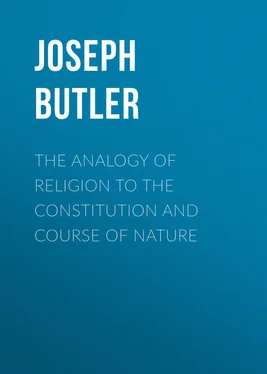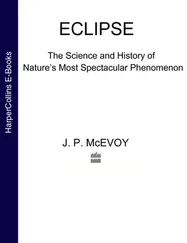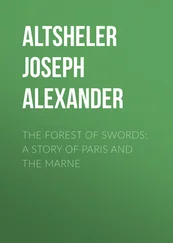Joseph Butler - The Analogy of Religion to the Constitution and Course of Nature
Здесь есть возможность читать онлайн «Joseph Butler - The Analogy of Religion to the Constitution and Course of Nature» — ознакомительный отрывок электронной книги совершенно бесплатно, а после прочтения отрывка купить полную версию. В некоторых случаях можно слушать аудио, скачать через торрент в формате fb2 и присутствует краткое содержание. Жанр: foreign_antique, foreign_prose, на английском языке. Описание произведения, (предисловие) а так же отзывы посетителей доступны на портале библиотеки ЛибКат.
- Название:The Analogy of Religion to the Constitution and Course of Nature
- Автор:
- Жанр:
- Год:неизвестен
- ISBN:нет данных
- Рейтинг книги:3 / 5. Голосов: 1
-
Избранное:Добавить в избранное
- Отзывы:
-
Ваша оценка:
- 60
- 1
- 2
- 3
- 4
- 5
The Analogy of Religion to the Constitution and Course of Nature: краткое содержание, описание и аннотация
Предлагаем к чтению аннотацию, описание, краткое содержание или предисловие (зависит от того, что написал сам автор книги «The Analogy of Religion to the Constitution and Course of Nature»). Если вы не нашли необходимую информацию о книге — напишите в комментариях, мы постараемся отыскать её.
The Analogy of Religion to the Constitution and Course of Nature — читать онлайн ознакомительный отрывок
Ниже представлен текст книги, разбитый по страницам. Система сохранения места последней прочитанной страницы, позволяет с удобством читать онлайн бесплатно книгу «The Analogy of Religion to the Constitution and Course of Nature», без необходимости каждый раз заново искать на чём Вы остановились. Поставьте закладку, и сможете в любой момент перейти на страницу, на которой закончили чтение.
Интервал:
Закладка:
2.) Now, why should a disease, at a certain degree, utterly destroy powers which were not even affected by it, up to that point?
3.That death at least suspends our reflective powers, or interrupts our continuing to exist in the like state of reflection which we do now.
Ans. There appears so little connection between our powers of sensation and our powers of reflection that we cannot presume that what might destroy the former , could even suspend the latter .
1.) We daily see reason, memory, &c. exercised without any assistance, that we know of, from our bodies.
2.) Seeing them in lively exercise to the last, we must infer that death is not a discontinuance of their exercise, nor of the enjoyments and sufferings of such exercise.
3.) Our posthumous life may be but a going on, with additions. Like the change at our birth – which produced not a suspension of the faculties we had before, nor a total change in our state of life; but a continuance of both, with great alterations.
4.) Death may but at once put us into a higher state of life, as our birth did; our relation to bodily organs may be the only hinderance to our entering a higher condition of the reflective powers.
5.) Were we even sure that death would suspend our intellectual powers, it would not furnish even the lowest probability that it would destroy them.
Objec. From the analogy of plants.
Ans. This furnishes poets with apt illustrations of our frailty, but affords no proper analogy. Plants are destitute of perception and action, and this is the very matter in question.
1.It has been shown, that confining ourselves to what we know, we see no probability of ever ceasing to be: – it cannot be concluded from the reason of the thing: – nor from the analogy of nature.
2.We are therefore to go upon the belief of a future existence.
3.Our going into new scenes and conditions, is just as natural as our coming into the world.
4.Our condition may naturally be a social one.
5.The advantages of it may naturally be bestowed, according to some fixed law, in proportion to one’s degrees in virtue.
1.) Perhaps not so much as now by society ; but by God’s more immediate action.
2.) Yet this will be no less natural , i. e. stated, fixed, or settled.
3.) Our notions of what is natural, are enlarged by greater knowledge of God and his works.
4.) There may be some beings in the world, to whom the whole of Christianity is as natural as the visible course of nature seems to us.
6.These probabilities of a future life, though they do not satisfy curiosity, answer all the purposes of religion, as well as demonstration.
1.) Even a demonstration of a future state, would not demonstrate religion, but would be reconcilable with atheism.
2.) But as religion implies a future state, any presumption against such a state, would be a presumption against religion.
3.) The foregoing observations remove all presumptions of that sort, and prove to a great probability, a fundamental doctrine of religion.
The question of a future life is rendered momentous by our capacity for happiness and misery.
Especially if that happiness or misery depends on our present conduct.
We should feel the deepest solicitude on this subject.
And that if there were no proof of a future life and interest, other than the probabilities just discussed.
1.We see them to be consequences of our actions.
2.And we can foresee these consequences.
3.Our desires are not gratified, without the right kind of exertion.
4.By prudence we may enjoy life; rashness, or even neglect may make us miserable.
5.Why this is so is another matter.
1.) It may be impossible to be otherwise.
2.) Or it may be best on the whole.
3.) Or God’s plan may be to make only the good happy.
4.) Or the whole plan may be incomprehensible to us.
Objec. It may be said “this is only the course of nature.”
1. The course of nature is but the will of God. We admit that God is the natural governor of the world: and must not turn round and deny it because his government is uniform .
2. Our natural foresight of the consequences of actions, is his appointment.
3. The consequences themselves, are his appointment.
4. Our ability to foresee these consequences, is God’s instruction how we are to act.
Objec. By this reasoning we are instructed to gratify our appetites, and such gratification is our reward for so doing.
Ans. Certainly not. Foreseen pleasures and pains are proper motives to action in general ; but we may, in particular cases, damage ourselves by indulgence. Our eyes are made to see with, but not to look at every thing: – for instance the sun.
It follows, from what has been said, that
1.Admitting that there is a God, it is not so much a matter of speculation, as of experience, that he governs us.
2.The annexing of pleasures and pains to certain actions, and giving notice them, is the very essence of government.
3.Whether by direct acts upon us, or by contriving a general plan, does not affect the argument.
1.) If magistrates could make laws which should execute themselves , their government would be far more perfect than it is.
2.) God’s making fire burn us, is as much an instance of government, as if he directly inflicted the burn, whenever we touched fire.
4.Hence the analogy of nature shows nothing to render incredible the Bible doctrine of God’s rewarding or punishing according to our actions.
As men object chiefly to future punishment, it is proper to show further that the course of administration, as to present punishment, is analogous to what religion teaches as to the future .
Indeed they add credibility to it.
And ought to raise the most serious apprehension.
1.They often follow acts which produce present pleasure or advantage.
2.The sufferings often far exceed the pleasure or advantage.
3.They often follow remotely.
4.After long delay they often come suddenly.
5.As those remote effects are not certainly foreseen, they may not be thought of at the time; or if so, there is a hope of escaping.
6.There are opportunities of advantage, which if neglected do not recur.
7.Though, in some cases, men who have sinned up to a certain point, may retrieve their affairs, yet in many cases, reformation is of no avail.
8.Inconsiderateness is often as disastrous as wilful wrong-doing.
9.As some punishments by civil government, are capital, so are some natural punishments.
1.) Seem intended to remove the offender out of the way.
Читать дальшеИнтервал:
Закладка:
Похожие книги на «The Analogy of Religion to the Constitution and Course of Nature»
Представляем Вашему вниманию похожие книги на «The Analogy of Religion to the Constitution and Course of Nature» списком для выбора. Мы отобрали схожую по названию и смыслу литературу в надежде предоставить читателям больше вариантов отыскать новые, интересные, ещё непрочитанные произведения.
Обсуждение, отзывы о книге «The Analogy of Religion to the Constitution and Course of Nature» и просто собственные мнения читателей. Оставьте ваши комментарии, напишите, что Вы думаете о произведении, его смысле или главных героях. Укажите что конкретно понравилось, а что нет, и почему Вы так считаете.












